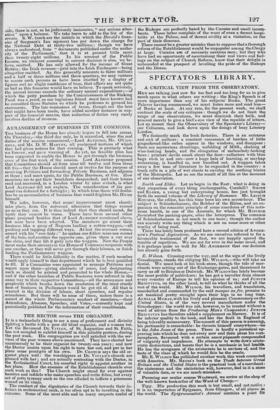ARRANGEMENT OF BUSINESS IN THE COMMONS.
THE business of the House has already begun to fall into arrear.
i On Thursday,—the third day only, be t remarked, since the real duties of the session commenced,—Lord ALTHORP, Mr. O'CoNNELL, and Mr. D. W. HARVEY, all postponed motions of which they had given notices for that evening. This is precisely what we foresaw, end gave warning of. As yet, no feasible plan has been suggested to enable the House to get through the business even of the first week of the session. Lord ALTHORP proposed that Committees should sit from nine till twelve and from three till five—that the House should meet at twelve for the purpose of receiving Petitions and forwarding Private Business, and adjourn at three ; and meet again, for the Public Business, at five. How members are to get their breakfasts despatched, and their letters read and answered, in a London winter by nine o'clock, is what Lord ALTHORP did not explain. The consideration of his proposal was deferred for a fortnight ; by which time there will doubtless be an accumulation of business that would frighten Mr. Husin himself.
We infer, however, that some': improvement must shortly take place, from the universal admission that things cannot go on as they are. It is time indeed that they should mend, for verily they cannot be worse. There have been several other plans proposed besides that of Lord ALTHORP mentioned above, but none have been adopted. The members go about their business like a gang of Negroes loading a cotton-waggon,—all pushing and tugging different ways. At last the overseer comes, armed with his " cow-hide :" he makes one fellow seize one corner of the bale, and another the opposite one, gives them a cut over the shins, and they lift it gaily into the waggon. Now the People must make their servants in the House of Commons cooperate with one another, or they will never get through their labours, or finish loading the Parliamentary waggon. There would be little difficulty in the matter, if each member • would apply himself to that department which he is best qualified to fill. If a Committee were appointed to arrange Petitions and report upon them—giving abstracts of some, and designating such as she uld be printed and presented to the whole House,— and if the other branches of Public Business were referred in the same way to their respective Committees,—all the annoyance and perplexity which breaks down the resolution of the most sturdy men of business in Parliament would be got rid of. All that is wanted is the division of labour, short speeches, and regular attendance. But there will be none of these, unless there is a record of the whole Parliamentary conduct of members,—their Attendance, Absence, Speeches, and Votes,—correctly kept and periodically published for the information of their constituents.


















 Previous page
Previous page